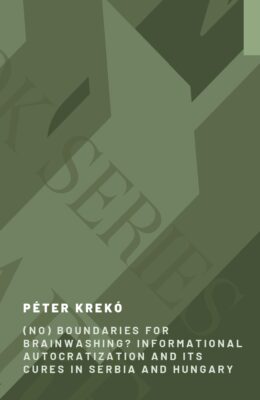
(No) Boundaries for Brainwashing? Informational Autocratization and its Cures in Serbia and Hungary
Given the increasingly intimate relationship between Hungary and Serbia, Orbán’s model can be increasingly attractive for Serbia on its own ambivalent path towards Euro-Atlantic integration. Despite the fact that Hungary, unlike Serbia, is a member of EU and NATO, media concentration and massive state-sponsored disinformation and conspiracy theorizing is on a less developed stage in the Vučić regime. At the same time, the Serbian president regards Orbán as a role model in many senses. Orbán’s role as a “teacher” of spin dictatorship can contribute to further deterioration of the quality and factuality of the information space in Serbia – if there are no efficient countermeasures from the EU and civil society actors.
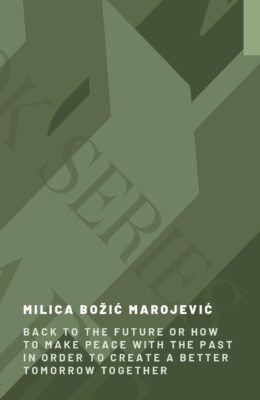
Back to the Future: How to Make Peace with the Past in Order to Create a Better Tomorrow
This study brings together three research directions: one concerns the role of heritage and education in the reconciliation process; the second includes the perspectives of art history students on the unwanted legacy of the past; and the third focuses on the lessons learned by investigating the first two phenomena. This paper focuses on the third segment. The main research question is: how can Serbs and Albanians, after everything that happened in recent decades in Kosovo, live together again? What can young people do and what is the role of education in all that? The key to this is changing the culture of hostility in the direction of a culture of a shared future. Those who can bring this to life most effectively are young people.
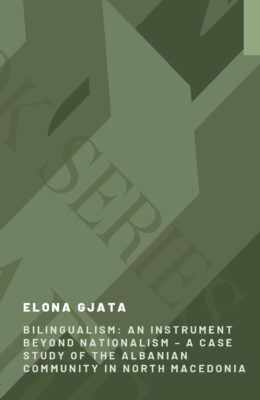
Bilingualism: A Bridge Beyond Nationalism – A Case Study of the Albanian Community in North Macedonia
The research focuses on the significance of studying bilingualism in multiethnic and multilingual societies, and seeks to provide insights into enabling all ethnic communities to participate equally in society. Specifically, the study aims to understand the challenges and opportunities of bilingualism within the Albanian community in North Macedonia. The study focuses on the young generation in high schools and universities, while also including local citizens’ perspectives. Through interviews with different individuals, the research aims to better understand the complex relationship between language and ethnic identity in the Albanian community.
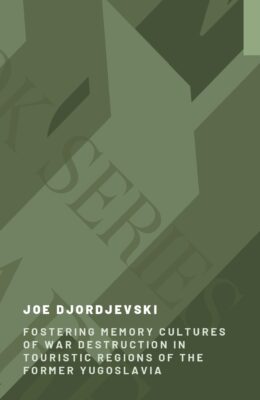
Fostering Memory Cultures of War Destruction in Tourist Regions of Former Yugoslavia
Memorial spaces for the Wars of Yugoslav Succession (1991–1999) have been a point of contention in southeast Europe. While there are important memory sites for victims of crimes and atrocities, monuments and commemorations often reflect dominant and hegemonic narratives that conform to top-down, exclusionary ways of looking at past events, fostering tension and division between societies. This research contends that changing the way the wars are remembered by looking at how they have impacted the region’s environments, can be used for consensus, education, and for reflecting on current and future problems. However, in particular many of the rural areas heavily impacted by the wars are undergoing tourist transformations, where memory of how the conflict affected landscapes and populations is either intentionally hidden from tourists or glossed over in favor of unrealistic representations of pristine, undiscovered, and safe environments. But creating spaces for memory of the wars in tourist areas presents a tremendous opportunity for both outside and local populations to reflect on how the wars have had long-lasting, slow-moving, and at times, invisible, effects that often continue to impact people living in the region.
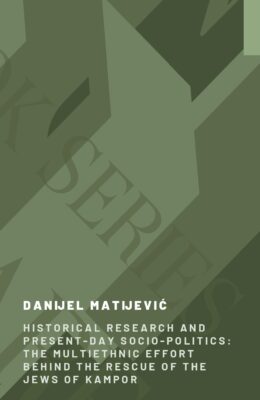
Historical Research and Present-Day Socio-Politics: The Multiethnic Effort behind the Rescue of the Jews of Kampor
The focus of this research is the rescue of the Jewish internees of the Italian concentration camp Kampor, which operated on the island of Rab in 1942–1943. In the fall of 1943, as Fascist Italy capitulated, the Yugoslav Partisan movement, which coalesced from the antifascist uprising that started in the summer of 1941, evacuated the Jews of Kampor to the liberated territories of Lika, Banija, and Kordun, and housed them there for the remainder of the war. Beside the rescue operation itself, the housing of the Jews of Kampor was a complex operation, dependent on intergroup cooperation and with a focus on coexistence, involving the efforts from a broad spectrum of Croatia’s and the region’s diverse ethno-confessional groups. This essay argues for committed state and socio-cultural stakeholder support and advancement of such histories, because they challenge established collective historical narratives that habitually favor a self-affirming, nationalistic view of the past, conducive to intergroup division and historiographical myopia.
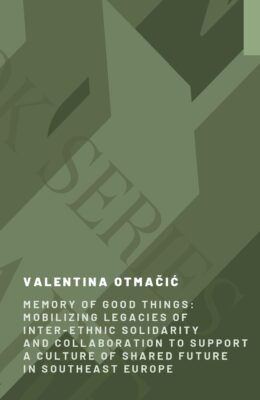
Memory of Good Things
This research explores the experiences and narratives of three multiethnic communities – that of Gorski Kotar (Croatia), Tuzla, and Baljvine (both Bosnia-Herzegovina) – that resisted inter-ethnic violence during the 1991–1995 Yugoslav wars. The research delves into the practices and methods of wartime mobilization of positive collective memories by members of these communities to address an important gap in the knowledge, and attempt to elucidate how good memories can be activated to support nonviolent political agendas. There is a need for concerted effort to ensure memories of a positive inter-ethnic past are preserved, celebrated, and promoted through multiple avenues and public memory tools, as they can have a significant positive impact on the present and the future of multi-ethnic societies.
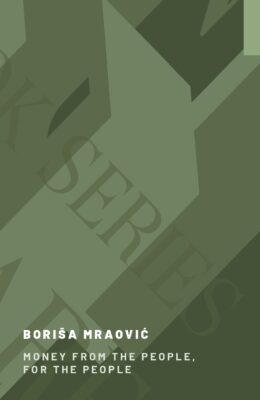
Money from the People, for the People
The unraveling of combined crises our societies are presently in will in the coming years put enormous pressures on public budgets. For this reason, there is an urgent need to rethink the nature as well as greatly develop the standard toolkit of fiscal policy. This article looks at one of the possibilities. It critically revisits the history of individual contributions (“samodoprinosi”), a unique democratic fiscal policy used extensively in socialist Yugoslavia for various infrastructure and social purposes. The study discusses how such a policy might be applied in the present conditions.

Nothing (:) Made in Yugoslavia
This text deals specifically with Yugoslav experimental art practices. It investigates the relationship between negation practices across different art forms and media – literature, film, visual arts, radio – in former Yugoslavia (1918–2006), as well as the notion of artistic, economic, and symbolic values. Yugoslav experimental art practices are bearers of decolonial aesthetics and its radical epistemologies. Examining how they questioned, even deconstructed, existing ideologies (and their values) helps create a space for us today to operate both within and beyond specific ideologies with more freedom.
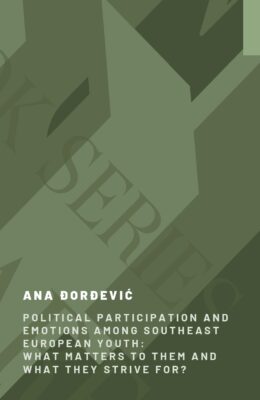
Political Emotions and Participation of the Southeast European Youth
Statistics usually fail to capture young people’s motivations to take part in political processes, that is, they overlook their understanding of politics. Our qualitative research shows that young people from Southeast European countries perceive politics as a process rather than a one-time voting event. They are uninterested because they find formal politics difficult or boring. Feelings of powerlessness, confusion, and ambivalence about their influence on decisions are followed by thinking about emigrating. Instead, we should change the way we do politics by nurturing political discussions and political literacy from a young age.
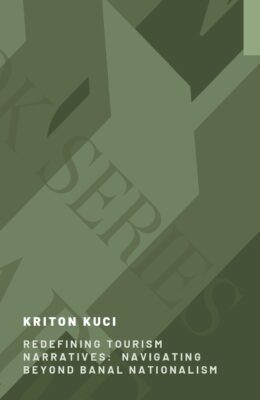
Redefining Tourism Narratives: Navigating beyond Banal Nationalism
This essay examines the relationship between tourism and nationalism, focusing on how national identity is constructed and promoted through tourism narratives. It highlights the case of Albania, showing how the country’s official tourism website reflects banal nationalism by using a primordialist approach to the history of Albania, emphasizing ancient roots and national struggles. The text argues that modern tourism often reinforces nationalist ideologies through historical narratives and cultural symbols, creating a simplified and exclusionary view of national identity. To counteract these tendencies, the essay suggests diversifying tourism narratives, promoting regional tourism, emphasizing sustainability, and fostering cross-cultural exchanges. These measures aim to create a more inclusive and balanced approach to tourism, acknowledging the complexities and diverse perspectives within national histories.
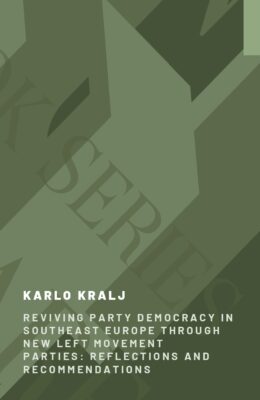
Reviving Party Democracy in Southeast Europe through New Left Movement Parties: Reflections and Recommendations
This essay reflects on the nexus of the crisis of parliamentary party democracy and the challenges of party organizing. It focuses in particular on the cases of new left movement parties that have emerged over the past decade in Southeast Europe, specifically Croatia, Serbia, and Slovenia. The central argument of the essay is that this breed of actors is confronted with two types of challenges: first, the need to maintain the identity of a left-wing challenger, while engaging in strategic collaboration with mainstream center-left parties; second, further organizational development that can innovatively address the contradictions between movement-based and party-based organizing.
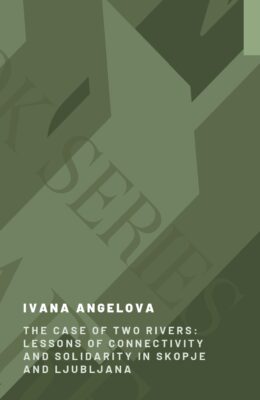
The Case of Two Rivers: Lessons of Connectivity and Solidarity in Skopje and Ljubljana
By comparing the riverbanks of the Vardar river in Skopje and the Ljubljanica in Ljubljana, this essay explores the political significance of public spaces and their role in fostering social cohesion and democratic engagement. The research highlights the varying successes and challenges in urban planning practices and public space utilization in these cities. Skopje faces issues of socio-economic segregation and underutilization of the Vardar, while Ljubljana is an example of successful integration of sustainable urban solutions with some minor social challenges along the Ljubljanica. The study emphasizes the importance of inclusive urban revitalization, community engagement, and sustainable development in creating democratic and resilient cities. Policy recommendations include equitable investment in public spaces, sustainable mobility plans, and fostering inter-ethnic communication and community participation.
